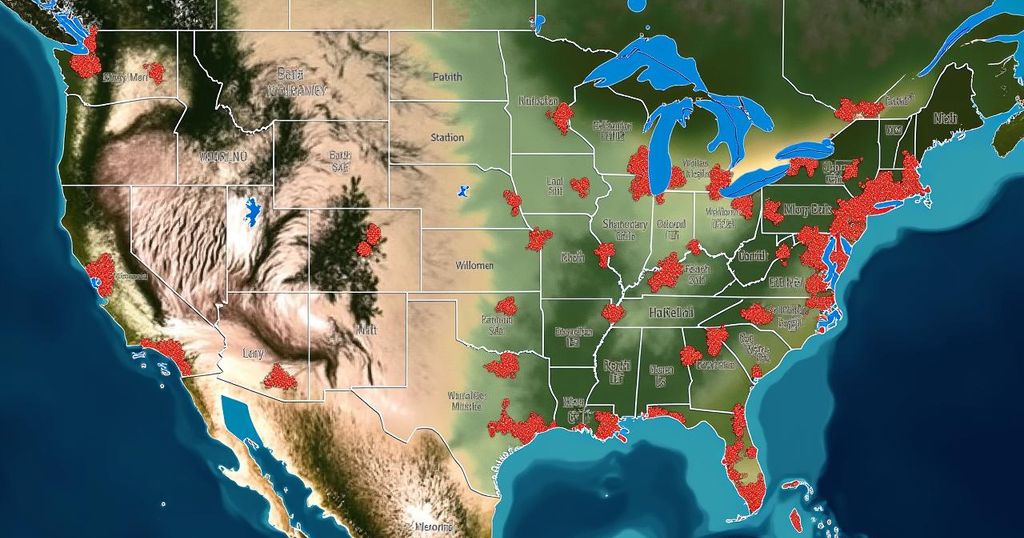Hurricane Milton: A Lesson on Storm Preparedness and Political Trust
Hurricane Milton approached Florida’s west coast with alarming predictions but ultimately resulted in minimal damage, prompting a re-evaluation of government warnings. While some residents felt the alarms were exaggerated, the event intertwines with broader political narratives about misinformation and government responsibility in disaster preparedness, especially as the nation nears election time.
Hurricane Milton, contrary to considerable preemptive warnings, proved to be less devastating than anticipated, particularly along Florida’s west coast. Authorities had issued extensive evacuation orders in anticipation of what meteorologists initially predicted could be a catastrophic storm. As I traveled from Fort Myers to Tampa, the impact of the hurricane became evident. While Hurricane Milton displayed unusual behavior, oscillating in its approach, its peak intensity diminished from a perilous category 5 to a more manageable category 3 overnight. This reduction significantly curtailed potential wind damage, although concerns about storm surge persisted. In Punta Gorda, I noted some minor disruptions including overturned boats, but the structural integrity of buildings appeared largely intact. Similarly, Venice exhibited only superficial damage, with fallen palm fronds and broken billboards, but no major ruin ensued. Continuing north, my team engaged with local authorities in Casey Key, where we assisted in checking homes for residents who might have chosen to weather the storm. Thankfully, the storm surge was measured at only one to two feet inside homes, a mere fraction of what had been anticipated. The Sunshine Skyway Bridge remained open and functional, ensuring northward travel continued apace. In St. Petersburg, the locally prominent Tropicana Field sustained damage to its roof; however, it presently functioned as a shelter for emergency personnel. The overall resilience of Florida’s west coast can be attributed, in part, to the successful evacuation orders heeded by most residents. Yet, skepticism regarding the exaggeration of the risk remains palpable. A notable comment came from the Mayor of Tampa, who cautioned that residents would face severe consequences should they choose to remain. In hindsight, many locals dismissed the alarm, attributing it to excessive political and media sensationalism. It prompts thoughtful deliberation whether the extensive pre-hurricane warnings represented an overreaction by the Biden administration, particularly in light of the disinformation disseminated by Donald Trump and his affiliates regarding Hurricane Helene’s response efforts. Recent remarks by Trump and his allies have implied that federal agencies hindered recovery operations, provoking frustration and skepticism among some individuals. To this effect, FEMA’s Administrator remarked that the conspiracy theories surrounding weather control have reached unprecedented levels of absurdity. As Hurricane Milton subsides, it becomes increasingly apparent that the political hurricane buffeting the United States is only beginning. With elections looming in under a month, one can expect the discourse surrounding disaster response and political accountability to intensify significantly.
Hurricane Milton formed in a period already marked with intense storm activity and heightened public awareness, given the previous storms, especially Hurricane Helene. Local and federal authorities instructed evacuations in preparation for significant potential devastation, considering recent trends in climate and hurricane behavior. The political landscape, dominated by figures like Donald Trump, has been rife with misinformation regarding disaster preparedness and response, creating a charged atmosphere as the storm approached Florida. The events surrounding Hurricane Milton are not merely a meteorological concern but part of a larger narrative involving political accountability and public trust in government responses during crises.
In conclusion, Hurricane Milton has underscored the complex interplay between meteorological phenomena and the sociopolitical landscape in the United States. Although the storm did not result in the anticipated devastation, it revealed significant public skepticism regarding governmental warnings and responses to natural disasters. As the country stands on the brink of an election, the conversation surrounding political narratives and disaster management will undoubtedly intensify, reflecting broader concerns about truth and accountability in the face of crisis.
Original Source: news.sky.com




Post Comment